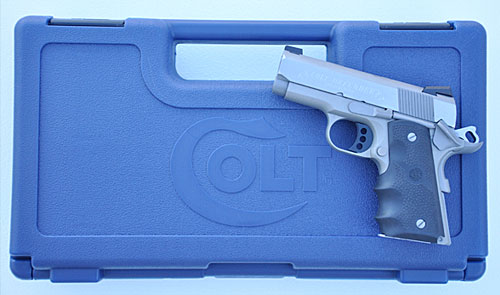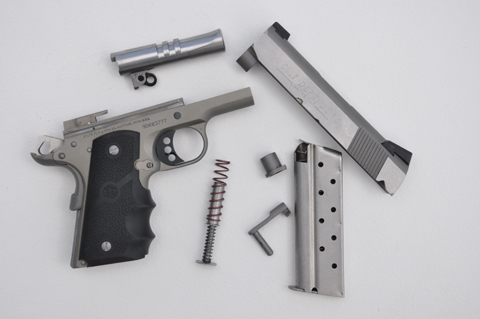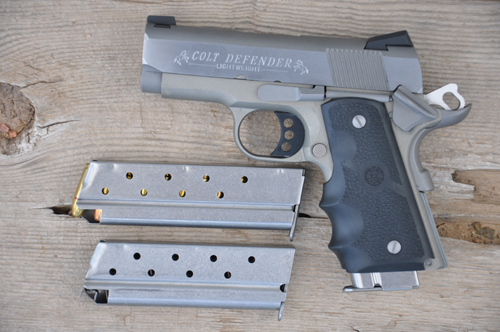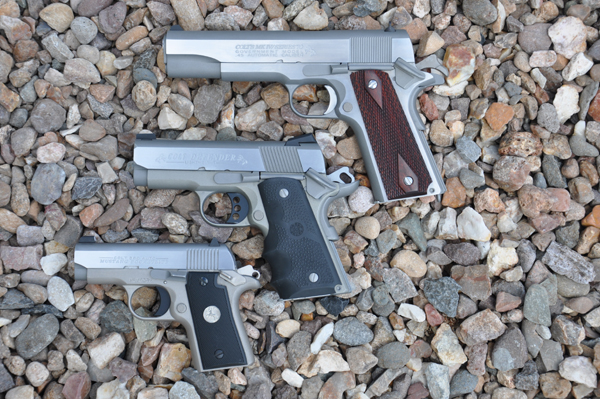 Several years ago we held a shooting industry event for women at Gunsite and invited a number of firearms companies to provide handguns from their product line they felt might be attractive to women interested in purchasing a gun for concealed carry. Then, we invited a group of women, including experienced and beginning shooters, to fire the guns, get some training with them and, in the end, pick their favorites.
Several years ago we held a shooting industry event for women at Gunsite and invited a number of firearms companies to provide handguns from their product line they felt might be attractive to women interested in purchasing a gun for concealed carry. Then, we invited a group of women, including experienced and beginning shooters, to fire the guns, get some training with them and, in the end, pick their favorites.
Joyce Rubino from Colt accepted the invitation and among the guns she provided were an original .380 Colt Mustang she took out of the secret vault hidden deep beneath the Colt factory and a Defender Lightweight in 9mm caliber. After a couple of days shooting the provided pistols and revolvers, when the smoke cleared, every woman in the group wanted two pistols and they were both Colts: The out of production Mustang and the Defender. The women got it – they wanted pistols with good triggers that were easy to manipulate and didn’t hurt their hands when they shot them. They wanted the Defender for a training/house pistol and the Mustang for concealed carry. I joined the chorus of those begging Colt to re-introduce the Mustang (see my recent test report on Downrange.TV) and annoyed Joyce until she was able to loan me a Defender 9mm for testing.
Stats and Facts
The Defender 9mm is a 25 ounce lightweight, meaning it has an aluminum alloy frame and stainless steel slide while assuming the proportions of an Officer’s Model. The barrel is 3″ long and magazine capacity is 8, so the Defender is down one round and about 11 ounces or so from a full size pistol. The Defender has the Series 80 firing system, meaning it has a firing pin safety along with the usual thumb safety and beavertail grip safety. The Defender is equipped with excellent three dot Novak Low Mount sights and the trigger on my sample breaks crisply at a touch over 5 pounds with just the tiniest bit of creep and no over-travel.
Takedown for cleaning is straightforward if you’re familiar with field stripping a 1911 type pistol.

To take the Defender apart I simply retract the slide to align the slide stop with the take down notch, pull out the slide stop and take the slide forward off the frame. The Defender uses a dual recoil spring arrangement with a coil spring over a recoil spring guide that contains a captive spring. After lifting the rear of the guide and removing the springs the recoil spring plug (that looks like a barrel bushing) can be removed from the rear then the barrel can be removed out the front of the slide. It’s easier and quicker to do than to describe. When reassembling the pistol here’s a little trick to make it easier. Re-assemble the slide then slip it back on the frame, front to rear. Before retracting the slide and trying to align the barrel link with the hole in the frame, place a punch in the slide stop hole and pull the barrel link down, and into alignment with the slide stop hole. Now, when you retract the slide to line up the slide stop notch the barrel link will be properly aligned and the slide stop can be slipped into place. Although my sample pistol is chambered in 9mm, the Defender is also available chambered in .45ACP, and therein lies a tale.
A few years ago I was teaching a Defensive Pistol class at Gunsite and two of the students, a father and his daughter, were shooting .45ACP Defenders. At graduation I cautioned the class to be in Condition Yellow when they left the school because, although it might never happen, an attack could come at any time, even right after leaving the ranch. Stopping for gas not far from the school, the father and daughter found themselves being surrounded by a group of young toughs who announced their intention of stealing the family’s motor home and abducting the girl. Exchanging a glance, Dad and his daughter turned back to back and drew their Defenders to low ready. As you might imagine, the thugs vanished and my students went safely on their way. Brings a tear to my eye…I love happy endings.
How Does It Shoot?
About like you would expect. With excellent sights and a crisp trigger, a grip that fills your hand and doesn’t leave your pinkie dangling underneath and the excellent pointing qualities of a 1911, shooting the Defender is a piece of cake. Recoil is minimal, even with +P+ ammunition. The pistol is more accurate than you or I can appreciate and I had no trouble hitting what I was aiming at back to 25 yards.

Recently some people trying to draw attention to themselves have been all over the ‘net declaring that compact or sub-compact 1911 pistols are unreliable and won’t even make it through a day of training without constant malfunctions. Although that hasn’t been my experience, what I will say concerning the Defender is that I took it out of the box and started shooting it. I have shot it a number of times since, with no cleaning or lubrication, and with several types of ammunition and it hasn’t malfunctioned yet. As far as I’m concerned, the Defender 9mm is accurate and reliable and I wouldn’t hesitate to carry it or shoot it in a training class. It will get the job done.

The Colt Defender Lightweight is a nice pistol. It would serve well as a compact pistol for concealed carry, home defense or training and fills a niche between a full size 1911 and a tiny one like the Mustang. The girls at Gunsite got it right when they decided they wanted a Defender 9mm.
Fore more information, visit coltsmfg.com.
About the Author:
 Ed Head is a regular on Shooting Gallery and Down Range TV. He has worked for almost 30 years in law enforcement, first in the United States Air Force and then with the United States Border Patrol, retiring as a Field Operations Supervisor. During his Border Patrol career, Ed worked in a variety of patrol, investigative and training capacities. Ed has an extensive background as a firearms instructor, having trained thousands, ranging from beginners to police, military and special operations personnel. Having taught at Gunsite for 20 years, Ed first trained there under the world famous shooting school’s founder, Jeff Cooper, then later ran the school as the operations manager for more than five years. Ed lives in Chino Valley, Arizona, where he continues to teach and write.
Ed Head is a regular on Shooting Gallery and Down Range TV. He has worked for almost 30 years in law enforcement, first in the United States Air Force and then with the United States Border Patrol, retiring as a Field Operations Supervisor. During his Border Patrol career, Ed worked in a variety of patrol, investigative and training capacities. Ed has an extensive background as a firearms instructor, having trained thousands, ranging from beginners to police, military and special operations personnel. Having taught at Gunsite for 20 years, Ed first trained there under the world famous shooting school’s founder, Jeff Cooper, then later ran the school as the operations manager for more than five years. Ed lives in Chino Valley, Arizona, where he continues to teach and write.
